IPU Assembly resounding success
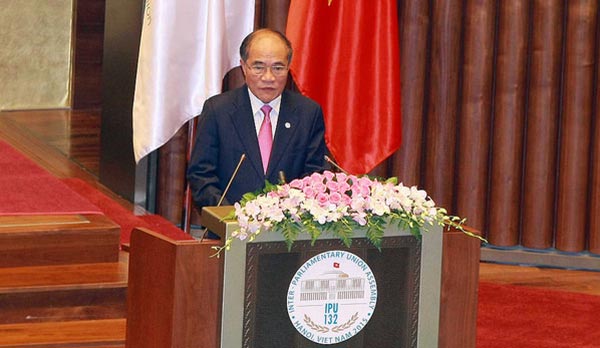
The National Assembly’s Chairman Nguyen Sinh Hung stated that the March 28 - April 1, 2015 event (IPU 132) “has become quite successful”, producing very good results.
“The summit, which is the biggest diplomatic event that Vietnam has ever hosted, has helped further strengthen Vietnam’s position internationally, having passed a number of important documents, especially the Hanoi Declaration,” Hung said.
IPU Chairman Saber Chowdhury stated that Vietnam’s selection of the event’s theme “The Sustainable Development Goals: Turning words into action” was right on target, fitting current global initiatives as well as IPU members states’ individual agendas.
“Good lessons have been learned from Vietnam,” he said. “We also highly value Vietnam’s great efforts in organising the IPU 132.”
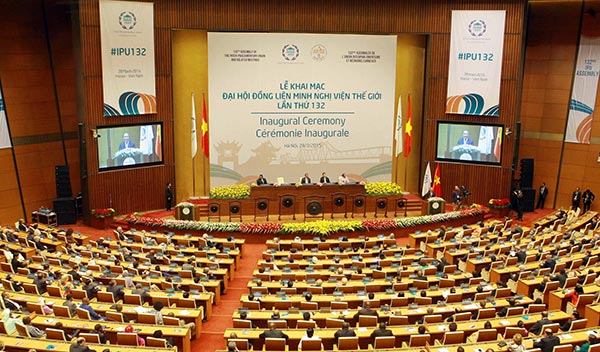
Major result: the Hanoi Declaration
At the event, members of the IPU have committed to taking the necessary action to carry forward the proposed new sustainable development goals (SDGs) due to be adopted later this year. The success of the sustainable development goals (SDGs) would transform the world and the lives of its people in a better, greener direction.
Parliaments from across the world reaffirmed their vision of sustainable development based on human rights, poverty eradication, peace and security in the Hanoi Declaration.
Endorsing a proposed and ambitious set of 17 goals, IPU members committed to ratifying them into enforceable domestic laws, to hold governments to account, and pledged to align their budgets with national sustainable development plans.
The Hanoi Declaration, the result of a debate on The Sustainable Development Goals: turning words into action, highlighted the need for institutions, such as parliaments, and decision-making processes to be strengthened in order for them to be able to effectively facilitate the realisation of the new SGDs.
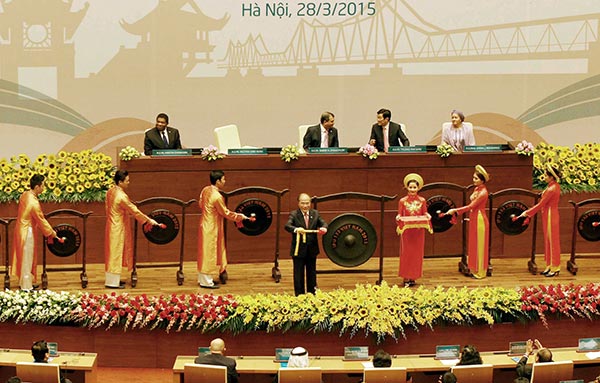
The summit: concerns and commitments
However, the proceedings of the 132nd Inter-Parliamentary Assembly point way beyond the signing of the Hanoi Declaration. In the decision-laden 132nd session hosted by the Vietnamese National Assembly, the IPU has adopted several resolutions which could impact global peace and security.
National parliaments are called on to implement international treaties and resolutions on water management and to secure the human right of having access to water and sanitation through laws and budget allocations.
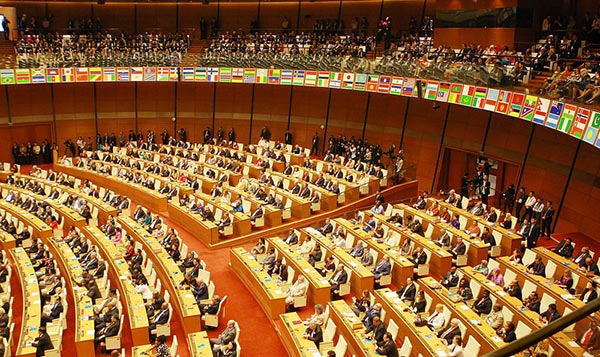
Water scarcity is already affecting one in every three people on the planet and in the absence of effective management of this critical resource, two thirds of the world’s population are expected to face water shortages by 2025. Urbanisation, population growth, climate change and environmental degradation are only some of the many factors putting enormous stress on water supplies around the world.
The IPU resolution calls on parliaments to advocate a dedicated and comprehensive water and sanitation goal in the new SDGs, with a particular view on the fact that access to clean water and sanitation remain part of the “unfinished business” of the Millennium Development Goals. Nearly 750 million people lack access to clean water and 2.5 billion are without acceptable levels of sanitation.
Effective water governance is also required to make sure conflicts between communities and states are avoided.
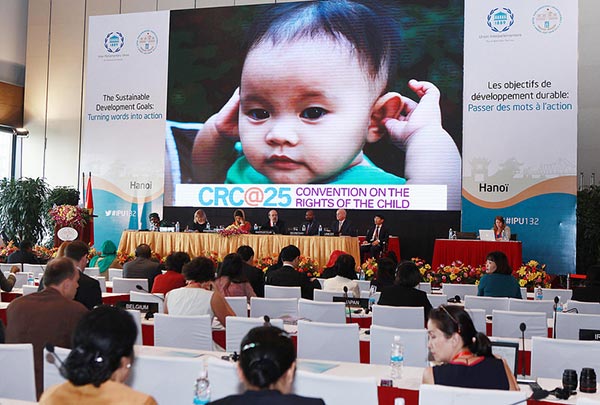
IPU members have also identified a comprehensive set of measures to counter the growing threat of cyber warfare to peace and global security, whilst acknowledging the need to strike balance between security concerns and respect for privacy and e-development.
Another important conclusion of Assembly was member states’ ultimate decision and pledge to ensure the law of armed conflict was extended to cyber warfare; parliaments shall now work in tandem with government branches and civil society to develop a cyber-security strategy and a national regulatory framework to ensure cyber technology is not used to foment international conflict or provide perpetrators with immunity and safe haven. The resolution also suggested defining an international convention that would provide a unified position on preventing cyber warfare.
In the final resolution adopted by the 132nd Assembly on the relation of international law and national sovereignty, non-intervention in the internal affairs of states and human rights, IPU members reaffirmed a commitment to democracy and an equitable international order based on the rule of law.
Highlighting the organisation’s as well as individual states’ respect for the principles of territorial integrity and sovereign political independence, the IPU resolution conveyed the member states’ intention to fulfil their obligations to promote, protect and safeguard human rights without discrimination.
What the stars mean:
★ Poor ★ ★ Promising ★★★ Good ★★★★ Very good ★★★★★ Exceptional
Latest News
More News
- Foreign leaders extend congratulations to Party General Secretary To Lam (January 25, 2026 | 10:01)
- 14th National Party Congress wraps up with success (January 25, 2026 | 09:49)
- Congratulations from VFF Central Committee's int’l partners to 14th National Party Congress (January 25, 2026 | 09:46)
- 14th Party Central Committee unanimously elects To Lam as General Secretary (January 23, 2026 | 16:22)
- Worldwide congratulations underscore confidence in Vietnam’s 14th Party Congress (January 23, 2026 | 09:02)
- Political parties, organisations, int’l friends send congratulations to 14th National Party Congress (January 22, 2026 | 09:33)
- Press release on second working day of 14th National Party Congress (January 22, 2026 | 09:19)
- 14th National Party Congress: Japanese media highlight Vietnam’s growth targets (January 21, 2026 | 09:46)
- 14th National Party Congress: Driving force for Vietnam to continue renewal, innovation, breakthroughs (January 21, 2026 | 09:42)
- Vietnam remains spiritual support for progressive forces: Colombian party leader (January 21, 2026 | 08:00)
















 Mobile Version
Mobile Version